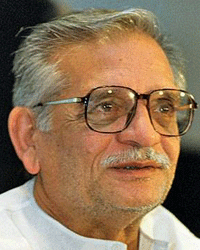
This article was last updated on April 16, 2022
Canada: ![]() Oye! Times readers Get FREE $30 to spend on Amazon, Walmart…
Oye! Times readers Get FREE $30 to spend on Amazon, Walmart…
USA: ![]() Oye! Times readers Get FREE $30 to spend on Amazon, Walmart…
Oye! Times readers Get FREE $30 to spend on Amazon, Walmart…
 Oscar award winning lyricist Gulzar has handpicked 100 of his best works that have been translated into English by scriptwriter Sunjoy Shekhar for an anthology titled ‘100 Lyrics’. The poet reveals that he was inspired by rocker Sting to come out with this compilation.
Oscar award winning lyricist Gulzar has handpicked 100 of his best works that have been translated into English by scriptwriter Sunjoy Shekhar for an anthology titled ‘100 Lyrics’. The poet reveals that he was inspired by rocker Sting to come out with this compilation.‘100 Lyrics’ is a bi-lingual volume that contains the original lyrics in Hindi along with their English translations, featuring anecdotes about the composition.
Published by Penguin-Books India, the yet-to-be released volume has English versions of the lyricist’s early hits like Mera Gora Ang Lai Le, the first film lyric that Gulzar wrote for Bimal Roy’s Bandini in 1963, to the enduring Dil Dhoondta Hai (Mausam), Naam gum jayega (Kinara), Humne dekhi hai un aankhon ki, Is mod pe jate hain (Aandhi) and Mera kucch Saman (Izazat).
Gulzar, who won an Oscar this year for the song Jai Ho in the film Slumdog Millionaire, has surprisingly drawn inspiration from English musician Sting.
“The popular musician Sting inspired me to compile this book. I have published several volumes of my poetry before and compiled my stories separately in two small volumes in Hindi. Somehow, I do not mix the two, except when my poems were picked up for a film and dressed with a musical rendering,” said Gulzar.
“Following in the footsteps of Sting, I undressed my lyrics and realised that lyrics can survive on their own without a mannequin or a visual. If not all, a good majority of them survived in another genre or form- as poetry,” says Gulzar in the book.
“When Sunjoy translated a few of my lyrics to English, they sounded suspiciously like poems. In a poem and a lyric, the major difference is that a poem is a personal expression of the poet, whereas in a lyric, the expression is primarily that of a character arising out of the situation of a film story,” Gulzar said.
The song Musafir hoon yaron… or I am, but a wanderer, my friends from the movie Parichay, recalls Gulzar, was his first song for Pancham or composer R.D. Burman.
“On his way to the Raj Kamal Studios, where he was supposed to record music for Parichay, he picked me up from home. He had explained the situation to me. En route, Pancham told me he had not thought about the score. ‘Give me a couple of lines and I can work on them, Pancham said’,” Gulzar recalled.
The lyricist thought of a few stray lines and after reaching the studio, he made Pancham write a couplet, Musafir hoon yaron… mujhe chale jaana hai, bas chalte jaana.
“Pancham dismissed me saying my work was over. At midnight, he knocked on my door and hauled me out of my bed into his car waiting below my apartment. He switched on the cassette and there was this incredible melody. As he raced his car down the empty streets of Mumbai, he hummed the tune and I supplied the words. That’s how we carried it forward,” Gulzar said, narrating how the popular song took shape.
Gulzar’s lyrics transcend social barriers, says translator Sunjoy Shekhar. “Be it a rickshaw-puller or a Sufi saint, Gulzar touches them both. The lyrics are not about words or rhythms, but about interpreting the world,” said Shekhar.
The translator, a native of Sahebganj in Jharkhand, has more than 3,000 hours of story-writing credits across a host of television channels in India.

Be the first to comment